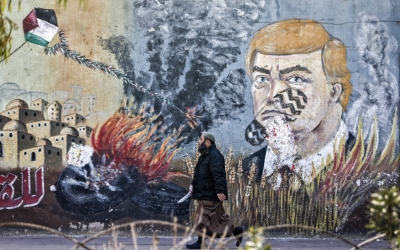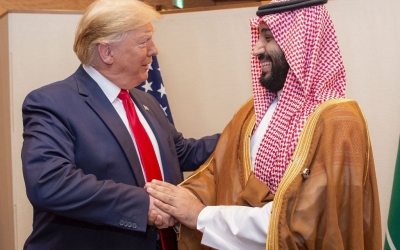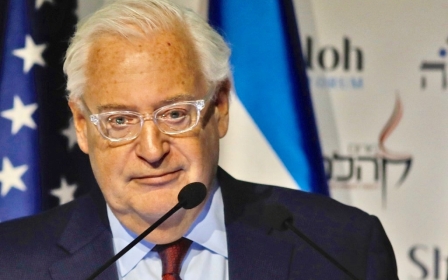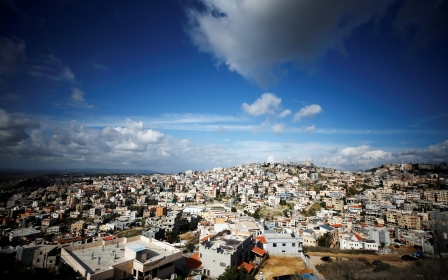Deal of the century makes 'Swiss cheese' of Palestinian territory: Abbas

Palestinian President Mahmoud Abbas was met with support at the UN Security Council (UNSC) on Tuesday, as he reiterated his opposition to the US's plan for solving the Israeli-Palestinian conflict.
During his address, which involved brandishing a large map of Israel and Palestine as laid out by the Trump administration last month, Abbas stressed his opposition to the plan, calling it a "Swiss cheese" deal that would limit Palestinian sovereignty.
New MEE newsletter: Jerusalem Dispatch
Sign up to get the latest insights and analysis on Israel-Palestine, alongside Turkey Unpacked and other MEE newsletters
"This is the state they will give us," Abbas said during his address. "It's like Swiss cheese. Really, who among you would accept a similar state and similar conditions," he asked council members.
The Trump plan, dubbed the "deal of the century", grants Israel several of its key long-held wishes, including full sovereignty over the disputed city of Jerusalem and the right to annex all settlements in the occupied West Bank.
In exchange, Palestine would be granted a demilitarised state in the remaining disjointed parts of the West Bank and Gaza, connected by a series of roads, bridges and tunnels.
Palestinians fully rejected the US's plan even before details were released, calling Washington a biased mediator, as news of the deal came after a series of pro-Israeli measures taken by President Donald Trump.
Done deal: How the peace process sold out the Palestinians
+ Show - HideMiddle East Eye's "Done Deal" series examines how many of the elements of US President Donald Trump's so-called "deal of the century" reflect a reality that already exists on the ground.
It looks at how Palestinian territory has already been effectively annexed, why refugees have no realistic prospect of ever returning to their homeland, how the Old City of Jerusalem is under Israeli rule, how financial threats and incentives are used to undermine Palestinian opposition to the status quo, and how Gaza is kept under a state of permanent siege.
-
Annexation: How Israel already controls more than half of the West Bank
-
Refugees: How Trump’s ‘deal of the century’ is doomed to failure
-
Jerusalem's Old City: How Palestine's past is being slowly erased
-
Gaza: How the Palestinian enclave has been strangled
-
Financial aid: How dependency on donors leaves Palestinians trapped
During his address, Abbas said he remained open to negotiations with Israel but rejected the US as a mediator.
"Some insist that this deal is just. No, this deal is not just," Abbas said. "I have come before you today to say that peace between Israelis and Palestinians is still possible, it is achievable. I have come to you to build an international partnership to achieve a just and lasting peace."
The US plan was unpopular at the UNSC meeting, with only representatives of Israel and the United States speaking up in favour of the deal.
Israel's ambassador to the United Nations, Danny Danon, accused Abbas of being unrealistic and said peace was not possible while the Palestinian president remained in power.
France, Estonia, Germany, Belgium, Russia, China, Indonesia, Vietnam, South Africa and Tunisia - among others - criticised the plan, calling on past UN resolutions and international law to be respected.
Most countries consider Israeli settlements on land captured in and after 1967 to be a violation of international law. Trump has changed US policy to withdraw such objections and the prospect of Israeli annexations drew widespread condemnation on Tuesday.
France's representative to the UNSC said Trump's deal "cements despair for young people" in Palestine, calling out the deal for rejecting long-standing international standards.
A lasting peace between Israel and Palestine "hinges upon negotiations, not unilateral decisions", France's representative said.
Annexation 'undermines' peace efforts
Germany also called on "direct negotiations between both parties".
Its representative stressed that any steps toward annexation would not be recognised by Berlin or its European partners.
Attempts to annex any part of Palestinian territory, including East Jerusalem, "would severely undermind" peace efforts, he continued, calling instead for fresh negotiations.
"The previous resolutions of this council reflect both International Law as well as parameters for these negotiations," Germany's representative said, rejecting the US proposal.
The UK called for the US plan to be the basis for opening up a dialogue between the two sides that could establish a plan both parties could agree upon.
Still, the UK stressed that any unilateral action "by any parties" would be condemned, highlighting London's opposition to Israeli plans to annex parts of the West Bank.
"We hope that President Abbas returns to negotiations, but if he cannot, that cannot justify annexation," the UK representative said.
Speaking at an election rally in the Israeli town of Bat Yam, Israeli Prime Minister Benjamin Netanyahu rejected the criticism Trump's plan garnered at the UNSC meeting.
"This is not Swiss cheese. This is the best plan that exists for the Middle East - for the Middle East - and for the state of Israel and for the Palestinians, too," he said, adding that the plan "recognises reality and the rights of the people of Israel, both of which you constantly refuse to recognise."
Middle East Eye delivers independent and unrivalled coverage and analysis of the Middle East, North Africa and beyond. To learn more about republishing this content and the associated fees, please fill out this form. More about MEE can be found here.







